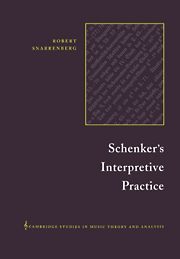4 - Participation
Published online by Cambridge University Press: 02 November 2009
Summary
Schenker once labeled his theory among other things as “a securing of instinct.” How keenly, therefore, he must have felt that that instinct had begun to fade in a serious way. But also how very much he must have been aware of his mission, which now lay in the salvation of the instinct that still existed.
The practice of interpreting artworks is a social phenomenon, a form of culture. It thrives only if other minds, other generations participate. When the interpreter of a musical artwork asks herself “What do I hear?” she engages in the activity of reporting to herself; even if her self-reporting is not made public, it still depends upon a social practice for its forms of representation, for just as there can be no private language, there can be no private interpretive practice. When reports do take the form of public expression, they can initiate a social exchange that centers about the question “Do you hear what I hear?” Whether one finds them in the studio, the lecture hall, in the pages of books and journals, or in snatches of conversation, whether they take the form of words, musical notation, a gesture, a dance, or even more music, public interpretive expressions are often motivated by a desire for a shared musical experience, a desire for the meaningful affirmation of “Yes, I do hear what you hear” What is called musical analysis or criticism is but one form of this social practice, albeit focused and highly developed.
- Type
- Chapter
- Information
- Schenker's Interpretive Practice , pp. 139 - 161Publisher: Cambridge University PressPrint publication year: 1997



